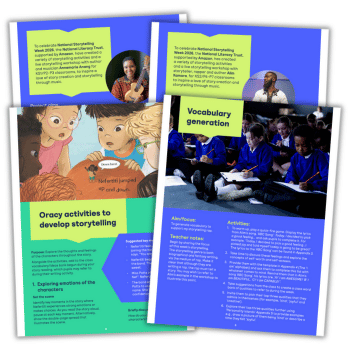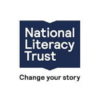Celebrate National Storytelling Week with this variety of story writing activities for KS1 and KS2. They will help to inspire a love of story creation and storytelling.
These activities allow pupils to experience writing as a fun and experimental creative process that gives them freedom to express their ideas and imagination.
KS1 activities
This classroom storytelling project with author and musician Annemarie Anang aims to inspire a love of storytelling, reading and writing for pleasure.
Through an interactive workshop and supported by engaging classroom resources, pupils will have the opportunity to explore and develop their storytelling and creative writing skills, culminating in writing a narrative.
By the end of the sequence, pupils will experience the joy of story creation and storytelling with an author, and they will also create narrative settings, characters and plot through a range of oracy and writing opportunities.
The virtual workshop takes place on Tuesday 3rd February 2026 at 9.30am. Annemarie Anang will explore her picture book I Am Nefertiti and lead a range of musical, interactive activities.
KS2 activities
For KS2, students will work with storyteller, rapper and author Alim Kamara. Through an interactive workshop, pupils will explore how to use rap as a creative tool to reflect on who they are and who they might imagine themselves to be.
Pupils will experiement with sound, rhythm and language to create a story using the medium of rap, exploring the question: “What if I were a superhero?” or “What would the superhero version of me be like?”
Alim Kamara’s workshop takes place on Tuesday 3rd February 2026 at 11am.
Previous years’ activities
KS1
These oracy and writing activities are based on Joseph Coelho’s picture book Our Tower. They encourage pupils to discover the magic of storytelling by drawing inspiration from the world around them.
Use the activities to build a storytelling project for the week. Alternatively, use them during your literacy time or by dedicating time outside your regular timetable.
After reading the book, children will discuss and imagine magical worlds hidden in everyday objects, guided by sensory and descriptive prompts.
They will then venture outdoors with “magic stones” to search for their own “hidden doors” in the school grounds or nearby areas.
Students will use their senses and imaginations to describe the sights, sounds, smells, and feelings associated with their chosen magical door. This will help them build a rich vocabulary to support their storytelling.
Back in the classroom, they will bring their ideas to life through writing, culminating in individual short stories.
KS2
The KS2 resource focuses on author Tọlá Okogwu. Pupils will have the opportunity to explore and develop their creative writing skills. The project culminates in children writing their own short narrative piece.
The sequence begins with character creation. Pupils will explore traits and superpowers, using examples from Okogwu’s Onyeka and the Academy of the Sun for inspiration.
Activities include brainstorming unique traits, freewriting and planning characters using prompts and a character outline template.
In subsequent sessions, pupils will develop their story’s setting and plot, experimenting with narrative techniques like building tension and resolving conflicts.
They will explore how ordinary scenarios can highlight a character’s unique traits and superpowers, drawing from class discussions and modelled examples. The final stage focuses on writing, editing and sharing their stories.
The National Literacy Trust offers resources, research, best practice, CPD, programmes and news to help you deliver outstanding literacy provision.

Similar resources
- Alan Turing lesson plan – First-person narrative writing
- No Refuge – Graphic novel activities about refugees for UKS2
- Christmas activity sheets – KS1 / KS2 fun & educational printables
- Learning gaps – How to ensure no pupil drifts too far
- Writing horror – Write a scary scene with Fear Files: Hide & Seek













